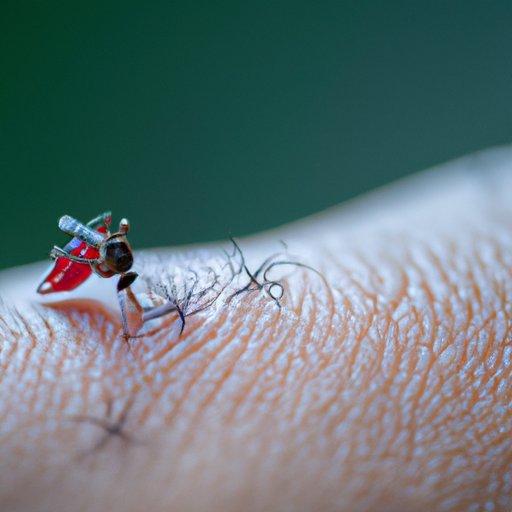Introduction
We’ve all been there—enjoying a beautiful summer evening, only to be pestered by a swarm of bloodthirsty mosquitoes. While some people seem to escape relatively unscathed, others might find themselves covered in itchy bites. If you’re one of the unlucky few who commonly get bitten, you may be wondering, “Why do mosquitoes love me?” In this article, we’ll explore the science behind mosquito attraction, offer practical remedies to repel them, and discuss some of the genetic factors that make certain people irresistible to these pesky insects.
The Science Behind Mosquito Bites: Why Some People are More Attractive to Them Than Others
Mosquitoes are attracted to humans for a variety of reasons. The most prominent are the chemical signals that our bodies emit. Female mosquitoes require protein from blood to lay their eggs, and they use a combination of olfactory and thermal cues to locate potential hosts. Carbon dioxide, lactic acid, and other volatile organic compounds emitted by humans are some of the primary chemical signals that attract mosquitoes.
In addition to chemical signals, mosquito behavior is also influenced by body heat and movement. Mosquitoes are drawn to body heat, which is why they tend to bite areas such as the neck, wrists, and ankles where blood vessels are closer to the surface of the skin. Mosquitoes can also detect movement, which is why they are more likely to bite people who are active or fidgety.
Outsmarting Mosquitoes: Tips and Tricks to Keep Them Away from You
While there is no guaranteed way to repel mosquitoes, there are some practical measures you can take to reduce your risk of bites. Some effective strategies include:
- Wearing loose, long-sleeved shirts and pants to cover exposed skin
- Using mosquito nets around your bed or outdoor seating area
- Avoiding being outside during peak mosquito times, such as dawn and dusk
- Using mosquito repellents, such as DEET or citronella
- Disrupting mosquitoes’ flight patterns with fans or other machinery.
Mosquito Magnets: Exploring the Factors that Make You a Target for These Pesky Insects
As mentioned, there are a variety of chemical signals that attract mosquitoes. However, there are also several biological and lifestyle factors that contribute to one’s susceptibility to mosquito bites. For example, people with type O blood are more attractive to mosquitoes than those with type A or B, and people who breathe heavily or have a higher metabolic rate may also emit more carbon dioxide.
Lifestyle choices can also play a role in mosquito behavior. Research has shown that people who drink alcohol are more likely to be bitten, possibly due to the increased metabolism and temperature that result from alcohol consumption. Additionally, pregnant women exhale up to 21% more carbon dioxide, making them more attractive to mosquitoes.
Finally, individual differences in chemical makeup can also influence mosquito behavior. Some people have unique markers in their sweat or skin that mosquitoes are drawn to. Similarly, research suggests that people with certain inherited traits may be more or less likely to be bitten, regardless of other environmental factors.
The Genetics of Mosquito Attraction: Are You Destined to be Their Favorite Meal?
While environmental factors certainly play a role in mosquito behavior, there is also evidence to suggest that genetics may be a key factor. For example, scientists have identified specific genes that affect the way humans emit certain chemical signals, which in turn may influence mosquito attraction. Similarly, studies of twins have suggested that around 85% of the variation in mosquito attraction may be explained by genetics.
While the role of genetics in mosquito attraction is still being studied, it seems clear that there are both environmental and genetic factors at play. Understanding the biology of mosquito attraction may help researchers to develop more effective repellents or treatments in the future.
Beyond Bug Spray: Natural Remedies to Repel Mosquitoes and Keep Them at Bay
While traditional mosquito repellents can be effective, many people prefer to use natural remedies for a variety of reasons. Some of the most popular natural remedies for repelling mosquitoes include essential oils, such as lemon eucalyptus, lavender, and peppermint. Additionally, some people claim that eating garlic or taking vitamin B supplements can reduce one’s attractiveness to mosquitoes.
While the scientific basis for these remedies is still being explored, there is some evidence to support their effectiveness. For example, one study showed that lemon eucalyptus oil was just as effective as DEET at repelling mosquitoes.
Conclusion
Ultimately, the best way to avoid mosquito bites is to take preventative measures such as using mosquito nets and wearing long-sleeved clothing. However, it’s also important to understand the factors that make some people more attractive to mosquitoes than others. By using this knowledge, you can take steps to reduce your risk of bites and stay comfortable throughout the summer months. If you have any additional tips or tricks for avoiding mosquitoes, feel free to share them in the comments below.
